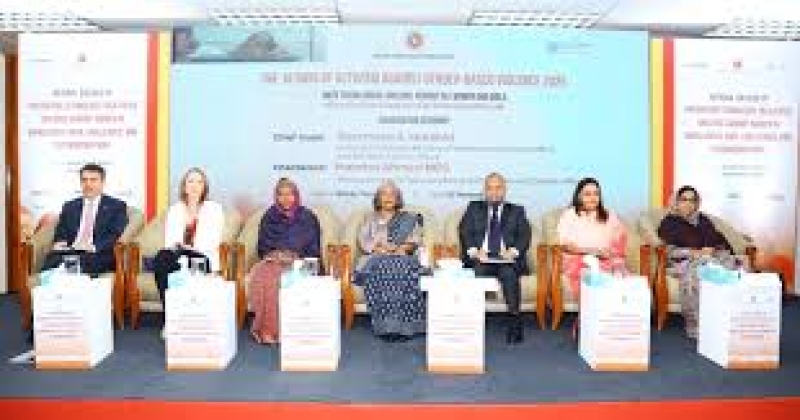- Dhaka updates noise pollution rules to curb rising sound levels |
- Unpacking COP30’s Politically Charged Belém Package |
- 2 tons of banned plastic bags seized in Faridpur |
- A woman or girl killed every 10 minutes, UN report finds |
- Cracks appear at newly built Secretariat building after quake |
Bangladesh launches national dialogue to end 'digital violence against women'

Bangladesh on Tuesday launched a national dialogue to address digital violence against women and girls, marking the start of the 2025 global “16 Days of Activism against Gender-Based Violence.”
The event was held at the Bangladesh China Friendship Conference Center in Dhaka, organized by the Ministry of Women and Children Affairs, the Local Consultative Group on Women’s Advancement and Gender Equality, and the United Nations.
The program brought together government officials, UN agencies, diplomats, civil society leaders, youth advocates, and technology experts to discuss the growing threat of technology-facilitated violence.
Chief Guest Sharmeen S. Murshid, Adviser to the Ministry of Women and Children Affairs, said, “Before, a girl couldn’t go out without worrying about eve teasing; now, you cannot enter cyberspace without being stalked. Technology has to move forward, but our attitude will determine its impact. The 16 Days of Activism remind us to act every day.”
Senior Secretary of MoWCA, Mamtaz Ahmed, called for stronger laws, better coordination among institutions, and increased public awareness.
UN Women Representative Gitanjali Singh highlighted that globally, between 16 and 58 percent of women and girls face online harassment, affecting their participation in public life.
Panelists at a high-level discussion, moderated by Dilara Begum, Joint Secretary of MoWCA, identified gaps including weak enforcement, lack of digital literacy, and the absence of a national framework to report and respond to online abuse.
Experts emphasized that digital violence is linked to social norms and power structures and needs coordinated prevention and accountability measures.
International representatives also spoke. Australian High Commissioner Susan Ryle urged collective action to make technology a tool for empowerment, while Swedish Ambassador Nicolas Weeks stressed proper enforcement of existing laws and the need for a Sexual Harassment Prevention and Protection Ordinance.
UNFPA Representative Catherine Breen Kamkong called for survivor-centred prevention and response mechanisms.
Speakers agreed that digital violence is not only a technological issue but a human rights and development challenge that limits women’s freedom and safety.
The event coincides with the 30th anniversary of the Beijing Declaration and Platform for Action and calls on government, civil society, and international partners to take concrete steps to eliminate technology-facilitated violence, reports UNB.

